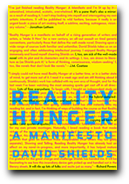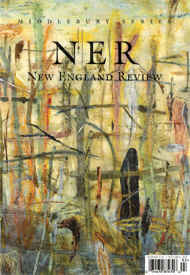 For most people who read fiction and spend much time online, this won’t be news: Electric Literature recently twittered the entirety of Rick Moody’s story “Some Contemporary Characters” over three days with the assistance of several co-publishers, of which Luna Park was one. The event was interesting to say the least, and response ranged from excitement to annoyance. Was the publishing event a success? It really depends on your perspective. Here’s a list of some of the more interesting responses that came out as the tweets were still rolling in: Carolyn Kellogg on Jacket Copy, Ryan Call on HTMLGIANT, Dennis Johnson on MobyLives, Patrick Brown for Vroman’s Bookstore. and Moody himself in discussion with The Brooklyn Ink.
For most people who read fiction and spend much time online, this won’t be news: Electric Literature recently twittered the entirety of Rick Moody’s story “Some Contemporary Characters” over three days with the assistance of several co-publishers, of which Luna Park was one. The event was interesting to say the least, and response ranged from excitement to annoyance. Was the publishing event a success? It really depends on your perspective. Here’s a list of some of the more interesting responses that came out as the tweets were still rolling in: Carolyn Kellogg on Jacket Copy, Ryan Call on HTMLGIANT, Dennis Johnson on MobyLives, Patrick Brown for Vroman’s Bookstore. and Moody himself in discussion with The Brooklyn Ink.
Luna Park is looking for submissions from editors and writers for our upcoming series on issues of Race, Class, Gender & Sexuality in independent publishing—an idea that arrived largely in response to a piece we published earlier this year by Roxane Gay “On Race and Publishing“). Below is more from assistant editor Marcelle Heath:
We’d like to invite editors and writers to participate in our new series on issues and representations of race, class, gender, and sexuality in independent publishing. How do these issues affect you as an literary magazine editor interested in publishing underrepresented communities, or a writer who wants to challenge dominant notions of identity? What are your thoughts, concerns, ideas about how literary communities reinforce, respond to, and confront racism, classicism, and sexism? Email Marcelle Heath at lunaparkonline@gmail.com.
 After last week’s post about excerpts from David Shields’s upcoming book Reality Hunger: A Manifesto in literary magazines such as A Public Space and PEN America, the editors of Knee-Jerk alerted me to the fact that they are publishing seven parts of the book, and have already published five along with an interview with Shields. (I also stumbled upon a great write up of the book and where to find excerpts of it on The Millions.)
After last week’s post about excerpts from David Shields’s upcoming book Reality Hunger: A Manifesto in literary magazines such as A Public Space and PEN America, the editors of Knee-Jerk alerted me to the fact that they are publishing seven parts of the book, and have already published five along with an interview with Shields. (I also stumbled upon a great write up of the book and where to find excerpts of it on The Millions.)
New England Review has published in their newest issue an absolutely fantastic group of writing about and by editor and writer Ted Solotaroff, who passed away in 2008. Solotaroff was founding editor of New American Review, one of the most successful and influential literary magazines of the late sixties and early seventies, publishing such now famous works as A. Alvarez on Sylvia Plath and an early draft of Philip Roth’s Portnoy’s Complaint. The NER issue includes a portion of Solotaroff’s unpublished final memoir covering his early days in the publishing world and remembrances by Robert Stone, Allegra Goodman, Robert Chohen, and many others.
 Words Without Borders has come out with an international science fiction issue. I doubt much else needs to be said. Okay, perhaps: Stanislaw Lem and Machado de Assis.
Words Without Borders has come out with an international science fiction issue. I doubt much else needs to be said. Okay, perhaps: Stanislaw Lem and Machado de Assis.
The New York Times’s ArtsBeat blog gives some ink to The Lumberyard, probably the most contemporary sounding poetry magazine in the business.
McSweeney’s San Francisco Panorama newspaper-style issue 33 will finally arrive next week on December 8, to be released by the San Francisco Chronicle. It seems apropos here to also mention Kevin Smokler’s interview at The Rumpus with new McSweeney’s publisher—and former Chronicle book review editor—Oscar Villalon.
Carolyn Kellogg writes for Jacket Copy about “Why a Literary Journal Returned to the 2008 Mumbai Attacks“—or, more specifically, why writer Jason Motlagh wrote four pieces about the attacks and their aftermath for The Virginia Quarterly Review. VQR Editor Ted Genoways sees Motlagh’s work for the magazine as “something that would be closer to literary nonfiction than traditional journalism—or even ‘new journalism.’ ” Kellogg writes:
If the report is of the kind we might expect to see from a handful of larger-circulation magazines such as the New Yorker, other venues have been retreating from this kind of extensively researched international writing. That a magazine like VQR—esteemed, yet with a modest and distinctly literary circulation—has undertaken such an effort demonstrates an enthusiasm for significant nonfiction storytelling.
Another new issue of >kill author (this time it is J. G. Ballard).
And even more from Kellogg at Jacket Copy: The Nervous Breakdown has gone from writer community to literary magazine (at least on the face of things).
 Hong Hao’s cover for the new Hayden’s Ferry Review made me pause for at least 30 seconds after I removed the issue from its mailing envelope this afternoon. (Picture of Hao’s cover at left.) Then I read pieces by Emily Carr, Matt Bell, Bernardo Atxaga, and Kelly Spitzer for the next 30 minutes.
Hong Hao’s cover for the new Hayden’s Ferry Review made me pause for at least 30 seconds after I removed the issue from its mailing envelope this afternoon. (Picture of Hao’s cover at left.) Then I read pieces by Emily Carr, Matt Bell, Bernardo Atxaga, and Kelly Spitzer for the next 30 minutes.
Finally, I recently received some more news about CLMP‘s forthcoming Literary Magazine Engagement Program—an exciting opportunity for students, professors, publishers, and writers:
CLMP, the Council of Literary Magazines and Presses, is launching a new ”Literary Magazine Engagement Program for Creative Writing Students.” Funded by the NEA, and coordinated in partnership with AWP, the new program offers half-price subscriptions for selected literary magazines to writing classes adopting them for course use. (Desk-copy subscriptions are available for professors.)
Additionally, once during the semester, senior editors from adopted magazines will take part in a virtual (or in person, if possible) meeting with participating classes. During this meeting, editors may discuss the history of their magazine, the current literary landscape, their curatorial process, etc., allowing students to better understand the publishing community in which they¹re most likely to be published. The ultimate goal of this program is to expose students to the variety of magazines out there and promote an active, engaged reading culture among young writers.
Participants will be able to choose from the following magazines for adoption during this pilot program:
Kenyon Review
Ploughshares
American Poetry Review
The Oxford American
A Public Space
New England ReviewClasses will be able to order magazines for course adoption directly through the CLMP web site. Please contact Jamie Schwartz for more information about joining the program, jschwartz@clmp.org.
Dec 3rd, 2009 at 10:55 am
That’s The Brooklyn INK.
Dec 3rd, 2009 at 10:59 am
Thanks — fixed the link to the Brooklyn Ink.